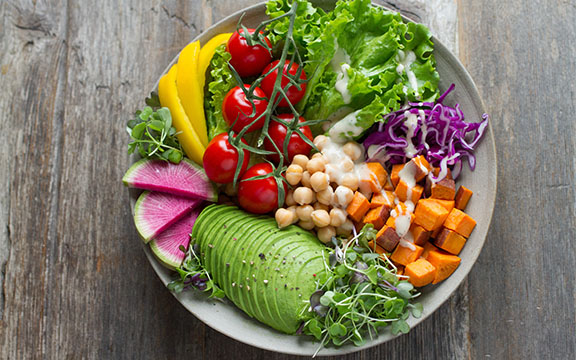
Photo by Anna Pelzer on Unsplash.
If you immerse yourself in your Yoga practice, you’ll undoubtedly notice many of your fellow yogis consume a plant-based diet. You may see your relationship with food changing, too. Why do so many yogis give up eating animals? While the practice deeply connects to Hinduism, Jainism and Buddhism, people from all faiths engage. Religious dietary restrictions may influence some, but it doesn’t explain the whole picture. Are you considering adopting a vegetarian or even a vegan diet since beginning your practice? Learn more about the interconnectedness of Yoga and plant-based diets.
Become Conscious of How Food Affects You Physically
Yoga helps us form a more intimate relationship with your body and physical self. As we breathe and move through various postures, we gain a deeper understanding of how interconnected the different aspects of health are. We also gain a reverence for our flesh and how it allows our spirit to interact with the world around us. We want to nurture and support this sacred vessel to continue learning, growing and contributing to the community.
Therefore, we start tuning into the nutritional benefits of food. Plant-based diets offer superior health benefits in numerous ways. Since Yoga teaches us to treat our bodies with respect and love, we’ll naturally gravitate away from additive-laden snacks and opt for foods close to their natural forms. That means consuming fewer calories overall, making it easier to maintain one’s body weight.
Choosing plants over meat, poultry, fish and dairy isn’t the only waistline-trimming benefit we can enjoy. Such foods are high in fiber, which benefits weight management in two ways. One, it creates bulk in your intestines, helping you feel fuller longer — meaning you’re less tempted to snack between meals and overeat at the table.
Furthermore, this prebiotic stuff nourishes the intestinal microbiome, a series of beneficial bacteria colonies responsible for sending messages to the brain. Folks with healthy microbiomes are more likely to transmit the “I’m comfortably sated” signal, telling your brain to turn off the hunger pangs.
Plant-based diets are also rich in a wide array of phytonutrients. These substances are critical for optimal health—think about lutein and zeaxanthin for eye health and lycopene for preventing prostate cancer in men. Those who primarily consume vegetables are more likely to “eat the rainbow” at each meal, getting a mix of hues to guarantee a full array of nutritional benefits.
Develop Greater Empathy Toward Other Living Beings
Getting in touch with our bodies through our work on the mat will teach us how strong we are. It also reminds us that all living things have innate vulnerabilities—and feelings that can hurt. As we breathe through challenging poses, we develop empathy for the pain sentient beings can experience, which drives our desire not to harm them.
The Buddha condemns eating meat. He says in the Lankavatarua Sutra, “Since all sentient beings are equal to me as my only son, how can I approve my followers to eat the flesh of my son?”
Although not all Buddhists adhere to a vegan or vegetarian lifestyle—even among mystics and teachers—those who practice Yoga gain a greater understanding and appreciation of physiology. We learn how different actions impact our central nervous systems. It doesn’t take a massive leap of empathy to recognize how other living things with similar systems share kindred feelings, making us less likely to cause unnecessary suffering by consuming their flesh.
The word “Yoga” means unity and the practice helps us recognize our oneness with other sentient life forms. Consider how most people would never dream of eating a dog or cat—they recognize them as companions, not mere animals. Yoga extends this feeling of camaraderie and friendliness toward other living beings like cows and chickens, too.
Cultivate Greater Concern for All Life
This heightened concern for other living beings extends beyond individual animals to the world. Climate change is one of the most pressing crises threatening all life on Earth and meat consumption undoubtedly contributes to global warming. Cattle are the number one agricultural source of greenhouse gas worldwide, spewing tons of methane into the air each time they belch or pass gas. This substance is far more damaging than carbon dioxide to the atmosphere.
While we realize our actions alone won’t solve the problem, we want to do our part. Therefore, we can decrease demand by reducing or eliminating meat consumption from our diets. Those who believe in the law of karma know it is Yoga in action—taking the lessons learned on the mat and using them to make a positive difference.
Intertwining Yoga and Plant-Based Diets
Have you noticed many Yoga practitioners follow a vegan or vegetarian lifestyle? The connection is no accident. Understanding the interconnectedness of Yoga and a plant-based diet can help us make better food choices. We’ll improve our health and that of the planet.
About the Author:
 Mia Barnes is a freelance health and wellness writer with a passion for Yoga, mindfulness and nutrition. She is also the Founder and Editor-in-Chief of Body+Mind Magazine, an online healthy living publication.
Mia Barnes is a freelance health and wellness writer with a passion for Yoga, mindfulness and nutrition. She is also the Founder and Editor-in-Chief of Body+Mind Magazine, an online healthy living publication.

